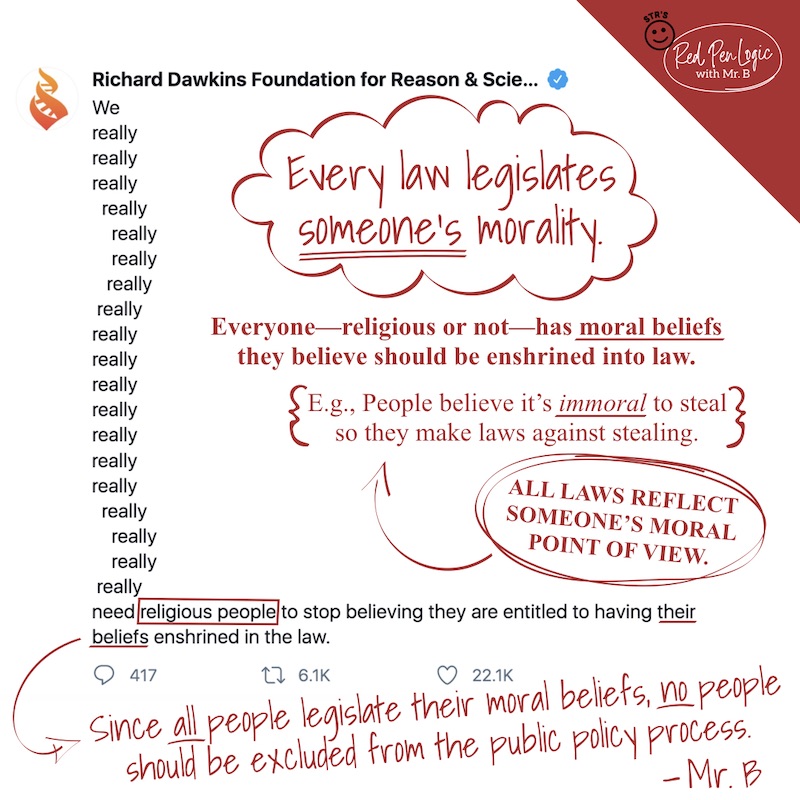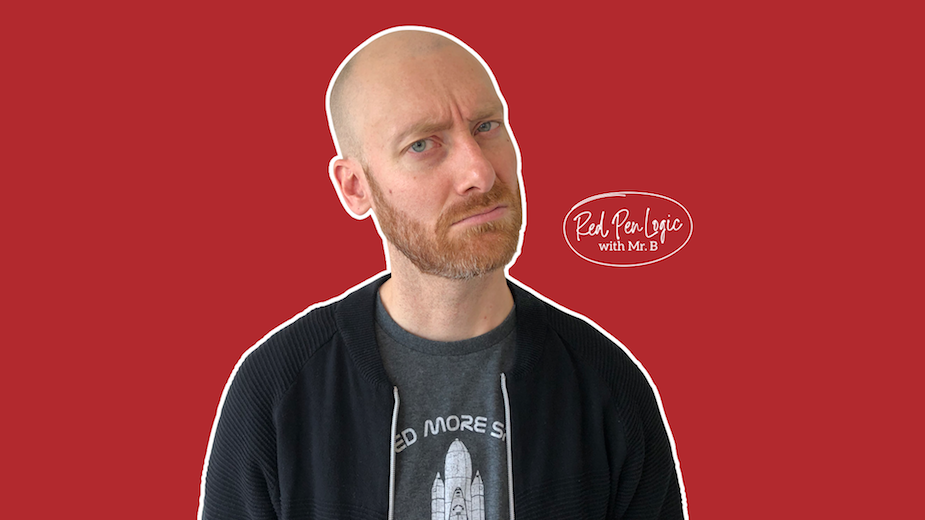
The Richard Dawkins Foundation wants to disqualify religious people from enshrining their beliefs in law. But this fails for two reasons. First, you can’t prohibit someone from legislating their moral beliefs since all laws legislate someone’s moral beliefs. That’s how the legislative process works.
Second, not all beliefs held by religious people are strictly religious beliefs. This distinction is really important since some want to simply label a belief as “religious” just so they can reject it. As it turns out, no one is trying to legislate strictly religious beliefs. And the examples typically given as religious beliefs are held with equal confidence by non-religious people.
Transcript
Hey, religious person. Yeah, I’m talking to you. You’re welcome to your beliefs, but don’t even think about trying to bring your beliefs into the public square. Your beliefs are not allowed.
This is Red Pen Logic with Mr. B, where we help you assess bad thinking by using good thinking. Plus, we try to have some fun while we’re doing it. In today’s tweet, Richard Dawkins Foundation for Reason and Science offers a tweet—ironically, with little reason and no science.
The tweet says, “We really really really really really really really really really really really really really...” (three days later) “really really really really really need religious people to stop believing that they’re entitled to having their beliefs enshrined in the law.”
According to the Dawkins Foundation, religious people should be disqualified from having their beliefs influence public policy. But with religious people excluded, who then gets to participate in the political process? Non-religious people like Richard Dawkins, perhaps? Well, that’s convenient. This kind of thinking isn’t just wrong, it’s dangerous. But don’t worry, danger is my middle name. (Actually, it’s Edward.)
The Dawkins Foundation wants to exclude religious people from enshrining their beliefs in the law. This thinking fails for two reasons. Here’s the first reason: All laws legislate someone’s moral beliefs. Each word in that sentence is important. Everyone has beliefs—things they hold to be true. I have beliefs, you have beliefs, and Dawkins has beliefs. I believe I have a beard. I don’t know if you’ve noticed. I believe I have a Morkiepoo who is super adorable. (Ah, so cute.) And I believe stealing my Morkiepoo is wrong. (Isn’t that right, Polly?)
Now, that last belief is different than the other two. It’s a moral belief. A moral belief concerns what is right or wrong, good or bad, and it’s moral beliefs that are the kind of belief that gets legislated. Think about it. Why do we have laws against stealing other people’s stuff? This isn’t a trick question. We have laws against stealing because people believe stealing is morally wrong.
In other words, stealing is illegal because it’s immoral. All legitimate laws are grounded in some moral belief some person holds. Without moral grounding, laws would simply be exercises in power, and that’s not right.
For example, murder laws are good because they’re based in the belief that it’s wrong to intentionally kill innocent human beings. Every law reflects someone’s moral point of view. So, the question then isn’t, “Should we legislate moral beliefs?” but rather, “Whose moral beliefs should we legislate?” So, everyone has moral beliefs they think should be enshrined in the law, as Dawkins puts it, not just religious people. So, why does Dawkins single out religious people, saying their beliefs should be disqualified? This leads to the second reason why this tweet fails.
Not all beliefs held by religious people are religious beliefs. Religious beliefs are very particular things. They are beliefs about religious things. (I’m not going too quickly here, am I?) So, only religious people hold these beliefs. They include doctrinal beliefs about things like baptism, or the Lord’s Supper, or how people get saved. Yes, it would be inappropriate to legislate one of these beliefs. But who’s trying to do that? No one, as far as I can see.
Now, you might be thinking, what about laws against abortion or against same-sex marriage? Aren’t these examples of legislating a religious belief? No. Here’s why.
The argument against abortion isn’t based on religion. It’s based on moral common sense. It is wrong to kill an innocent human being, and pro-lifers point to science and philosophy, not religion, to point out that abortion kills an innocent human being. Therefore, abortion is wrong. Likewise, arguments for traditional marriage can be made without quoting chapter and verse. Remember, just because a religious person holds a belief doesn’t mean it’s merely a religious belief.
Look, most religious people are against stealing. In fact, the Bible says you should not steal, but that doesn’t mean that the belief that stealing is wrong is a religious belief. Just ask your non-religious friend why he’s against stealing. I bet he doesn’t quote the Bible. Here’s the basic rule. If a non-religious person can make the same basic argument about a belief that a religious person can make, then it’s not a religious belief.
So, what have we learned? The Dawkins Foundation wants to exclude religious people from enshrining their beliefs in the law. This fails for two reasons. First, you can’t prohibit someone from legislating their moral beliefs since all laws legislate someone’s moral beliefs. That’s how the legislative process works.
Second, not all beliefs held by religious people are religious beliefs. This distinction is really important because some want to label a belief as religious just so they can reject it. (I’m looking at you, Dawkins.)
As it turns out, no one is trying to legislate strictly religious beliefs, and the examples that are typically given are held with equal confidence by non-religious people. Since all people legislate their moral beliefs, no people—religious or non-religious, black or white, gay or straight, with hair or without—should be excluded from the public policy process. Class dismissed.

